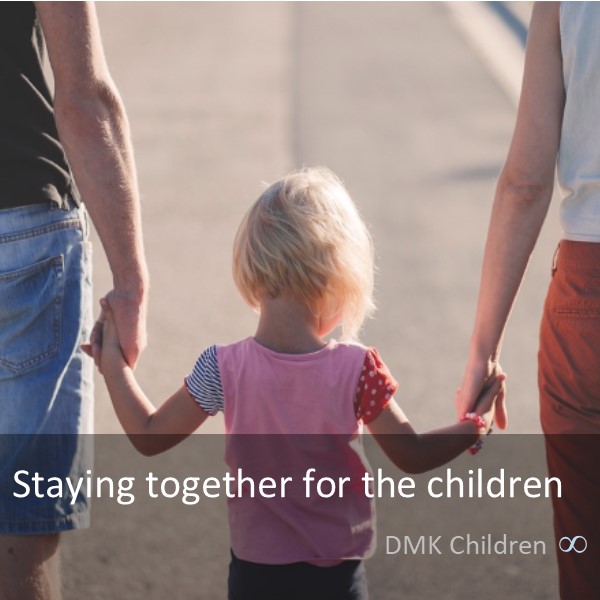Nearly half of American children under the age of 18 will witness their parents' divorce. Based on current statistics, once they are adults, they have a 90% chance to marry and nearly half of those who do, will also divorce.
In addition to the dismal divorce statistics, we may also begin to recognize the parallel of bad relationships witnessed as children may be linked to choices and behavior traits during adulthood. These choices and traits may be the primary reasons that lead our children to meet similar potential for divorce and possibly other challenges as adults.
Moreover, the cumulative experiences children of divorce face may also contribute to poor relationship skills and continued degradation of the expectations of marriage and family as adults.
Understanding the problem
It is important to remember that to consider the problem as only divorce would be like saying your uncle died of a brain injury, when, in fact, he died of a brain injury sustained in a car accident.
The question, “How did your uncle die?”.
The correct answer, “He died of a brain injury sustained in a car accident.”.
The point here is that the divorce is an effect of a failed marriage, the cause. Long-term problems stem from both a bad marriage and divorce. Unfortunately, we recognize the issue as just the divorce since divorce is always a result of a failed marriage but failing marriages may not always end in divorce.
The question, "Why do you think you have poor relationship skills?".
The incorrect answer, "Maybe it's because my parents got a divorce and it affected me?"
The correct answer, "My dad was never around and drank too much. My mom had several affairs and was a rather dishonest person. They eventually divorced which caused financial issues before my dad finally just stop coming around. I had to work at a young age to make sure there was enough food for me and my three brothers. They said the divorce was a good decision, but it didn't really make things better for us kids. I never felt loved or nurtured."
While the complicated nature of the cause varies for everyone, the basic example here is that divorce is not the primary cause. The marriage issues are often complicated and equally devastating to the individual. The effect of witnessing his/her parent's bad marriage may lead to future shortcomings in their own relationships as adults more so than the familial changes sustained a result of the divorce.
We can begin to realize that regardless of if a divorce takes place or not, the child will still have the effect of witnessing and experiencing his parent's failing marriage. The longer your child witnesses the complexities of such a bad marriage, the higher the likelihood that the child will have some lasting issues that affect him/her as an adult. This means parents should seek help through counseling or other therapeutic measures regardless of divorce.
Divorce
If parents are going to commit to divorce, they should have a realistic expectation to improve their own lives and the lives of their children if the divorce is to be a successful means to solving the problems the marriage has caused. In doing so, the divorce could possibly reduce the long-term negative effects on their children and their future relationships.
Staying together
If the parents choose to remain together, the choice to do so must be in the best interest of the marriage and both spouses. In doing so, the loving relationship and strength to overcome the marriage's shortcomings could provide relationship skills for the children as well. In doing so, the children will have been positively affected. To stay together for the children only, would likely still expose the children to an environment where two incompatible people maintain a relationship that is without the necessary elements of a stable marriage and home. Such exposure is a poor example for children to learn the value of a loving, committed relationship.
Fix the future, not the past
If you and your spouse feel divorce is the best option, a primary goal should be to work independently to improve your relationship skills by recognizing some of the causes you contributed to the failing marriage. Unfortunately, it takes many of us a few more failed relationships before we begin to see the opportunity for any self-correction. It helps to work with a therapist or counselor that can help you decipher the complexities of your own problems and problems that may or may not have stemmed from your own childhood.
Statistically, once we divorce, we have a 60% chance of divorce again if we remarry and then more than 70% chance of divorce if we marry a third time. This is compelling evidence that many of us who divorce fail to recognize issues we take with us like baggage from one marriage to the other. Such issues that may or may not have originated from our own childhood, diminish our chances of a happy marriage, lasting relationships and bond with our own children.
Ending the cycle of "failing marriages" will be beneficial for your children since they will have the opportunity to witness your improved relationship skills to maintain a healthy relationship and demonstrate a good example of a loving spouse and successful marriage.
Improving one's relationship skills reaches past marital relationships. It helps improve all relationships including the relationship between parents and children.
Many of us do not seek resources regarding the effects of divorce until the marriage is near terminal. If a marriage is over, it's over, it does not help to maintain something that provides negative and destructive energy to those who are affected by it.
Again, this goes back to the “uncle” analogy. We recognize the problems children face as a result of the divorce, but really, we must recognize the problems are not just from divorce. The problems may also have been originated in witnessing everything that lead to the divorce or in a parent’s attempt to stay together for the children. Such an attempt only exposes them to ongoing marital problems and bad relationship skills between the two people they need the most. It further affects their relationship and opinions the children have of each parent. It may also affect the child's opinions of the opposite sex. In the end this may result in their experiencing poor relationships as adults.
Help your children when you help yourself
Acknowledge if a bad marriage exists as early as possible. While some marriages may be saved with professional intervention and changes by one or both parents; staying together merely for the sake of the children is unwise. Many times, we don't seek help for our individual problems until after a divorce. Even if we solve our own issues, the problem of the marriage may already be too complex or beyond the possibility of being saved. However, personal improvements may still provide more stable parenting methods helpful during the multiple phases of the divorce the family will experience.
The way to help your child is to try to understand why the relationship is failing or has failed. Learn how your own personal improvements and choices for happiness can improve your life and theirs. Demonstrate self-determination, improved relationship skills and empathy to adequately heel any pain or possible long- term damage your child has experienced as a result of the divorce. This may improve your child’s behavior, emotional balance and potential for excellent interpersonal skills now and in the future.
Disclaimer
The information provided by respective owner's ("we", "us" or "our) on Divorce Me Knot (referenced also as "DivorceMeKnot.com", "dmk", "DMK", "OurDMK.com", "OurDMK", "application" or "site") is for general informational purposes only and is subject to change with or without notice. All information on our site and application is provided in good faith, however we make no representation, guarantee or warranty of any kind, express or implied, regarding the accuracy, validity, adequacy, reliability, availability or completeness of any information on the site or application.
The information in articles and all content on this site should not be considered psychological or behavioral health therapy, counseling or legal, financial, real estate, mortgage, insurance or professional advice. It should not be used in place of professional advice from a licensed professional or credentialed expert. Providers of content on this site, herein known as "Contributors" (inclusive of, but not limited to writers, bloggers, editors, employees, developers, graphic designers, advertisers, partners, affiliates, references, experts, professionals and site owners) are not legally liable for any misinformation, errors or omissions. Names, details and images may have been changed in the content of this site.
Under no circumstances should DMK and/or it's Contributors have any liability to users of the site for any loss or damage incurred to users as a result of the use of this site or application or reliance of any information provided on the site or application. Use of the site or application and reliance on any information from the sight or application is solely at the user's own risk.
For complete site disclaimers review "Disclaimers" on this site or click the link below.
Read Complete Site Disclaimers Here




 How to resolve AdBlock issue?
How to resolve AdBlock issue?